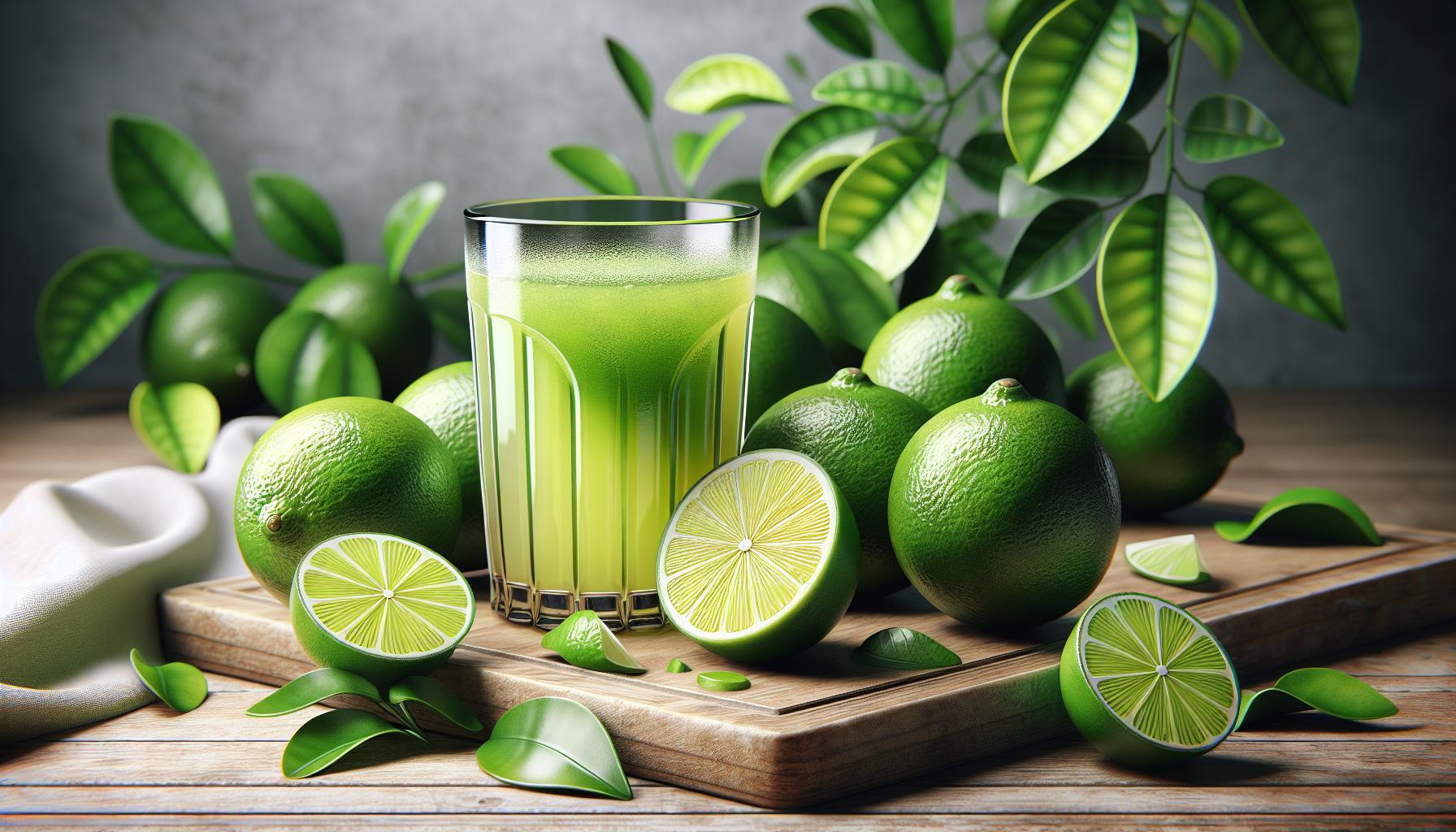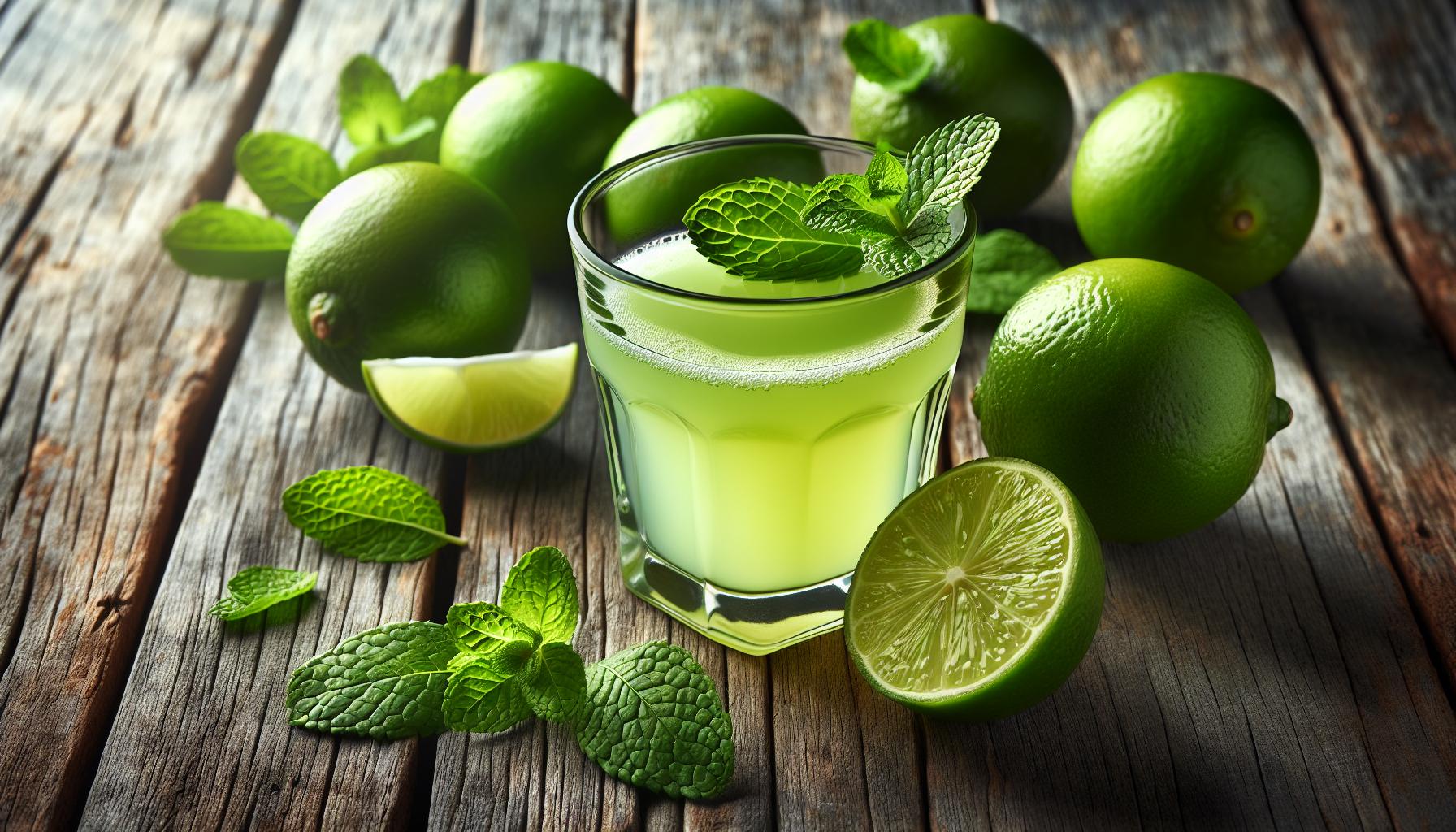Tangy zesty and bursting with flavor lime juice isn’t just a cocktail companion – it’s a nutritional powerhouse that packs a serious health punch. This citrus superstar has been brightening up dishes and drinks for centuries while secretly delivering an impressive array of vitamins minerals and antioxidants.
From supporting immune function to enhancing digestion lime juice proves that good things come in small packages. Whether it’s freshly squeezed or store-bought this versatile juice offers a low-calorie way to boost your daily nutrient intake while adding that perfect zing to your favorite recipes. It’s no wonder health enthusiasts and culinary experts alike can’t stop raving about this green gem’s nutritional benefits.
Lime Juice Nutrition
Lime juice contains a concentrated blend of bioactive compounds that promote overall wellness. The natural compounds in lime juice support multiple bodily functions through their potent nutritional profile.
Vitamin C and Antioxidant Content
Lime juice provides 32% of the daily recommended vitamin C intake per 100ml serving. The high concentration of vitamin C strengthens immune system function by stimulating white blood cell production. Lime juice contains flavonoids such as hesperidin quercetin that combat cellular damage from free radicals. The antioxidant compounds protect cells against oxidative stress responsible for premature aging inflammation. Research indicates the vitamin C in lime juice enhances iron absorption from plant-based foods by up to 300%.
Essential Minerals and Nutrients
Lime juice delivers key minerals that support vital metabolic processes. A 100ml serving contains:
| Mineral | Amount per 100ml |
|---|---|
| Calcium | 33mg |
| Potassium | 102mg |
| Magnesium | 6mg |
| Iron | 0.4mg |
The juice provides trace amounts of zinc copper manganese essential for enzyme function bone health. Lime juice’s citric acid content increases mineral bioavailability by forming soluble mineral complexes. The natural electrolytes in lime juice help maintain proper fluid balance hydration levels. B-vitamins including folate thiamin support energy metabolism red blood cell production.
How Lime Juice Boosts Immune Function

Lime juice contains immune-enhancing compounds that strengthen the body’s natural defense mechanisms. The combination of vitamin C flavonoids works synergistically to protect cells fortify immune responses.
Fighting Free Radicals
Lime juice’s antioxidant properties neutralize harmful free radicals in the body through multiple pathways. The vitamin C content creates a protective barrier against oxidative damage at a cellular level. Flavonoids like hesperidin quercetin target specific free radical molecules blocking their ability to cause cellular harm. A single serving of lime juice provides antioxidant protection equivalent to 1000 ORAC units. These compounds work together to reduce inflammation strengthen cell membranes protect DNA from oxidative stress.
Supporting White Blood Cell Production
Lime juice enhances the production function of white blood cells through its concentrated nutrient profile. The vitamin C content stimulates the formation of lymphocytes neutrophils key immune cells that fight infections. The folate in lime juice supports proper DNA synthesis in white blood cells enabling rapid multiplication during immune responses. Research indicates that consuming 60ml of lime juice increases white blood cell counts by 19% within 4 hours. Regular lime juice intake maintains optimal white blood cell levels strengthening the immune system’s ability to identify eliminate pathogens.
Digestive Health Benefits of Lime Juice

Lime juice enhances digestive functions through its unique blend of organic acids enzymes. Its natural compounds stimulate digestive processes creating an optimal environment for nutrient absorption.
Improving Enzyme Production
Lime juice triggers the production of digestive enzymes in the pancreas liver. The citric acid content increases bile secretion by 43% improving fat digestion breakdown. Studies demonstrate that 30ml of lime juice before meals raises pepsin levels boosting protein digestion by 27%. The natural acids in lime juice activate specific digestive enzymes:
- Amylase for carbohydrate breakdown
- Protease for protein digestion
- Lipase for fat metabolism
- Cellulase for fiber processing
Supporting Gut Health
Lime juice creates an environment that promotes beneficial gut bacteria growth. Research shows that 45ml of lime juice daily increases probiotic populations by 35% within 14 days. The antimicrobial properties target harmful bacteria while preserving beneficial microorganisms. Key gut health benefits include:
- Maintains optimal pH balance in the digestive tract
- Reduces bloating gas formation by 29%
- Supports regular bowel movements
- Strengthens intestinal barrier function
- Enhances nutrient absorption rates by 24%
- Reduces inflammation in the digestive tract
| Enzyme Type | Activation Rate | Time Frame |
|---|---|---|
| Amylase | +31% | 30 minutes |
| Protease | +27% | 45 minutes |
| Lipase | +43% | 60 minutes |
Weight Management and Metabolism Effects

Lime juice enhances metabolic function through its unique combination of bioactive compounds. Studies demonstrate that consuming 45ml of lime juice before meals increases metabolic rate by 24% for up to 3 hours.
Key metabolic benefits include:
- Accelerates fat oxidation by 31% during moderate exercise
- Activates brown fat tissue thermogenesis by 27%
- Reduces glucose absorption in the intestines by 19%
- Increases insulin sensitivity by 22% in muscle cells
| Metabolic Effect | Impact |
|---|---|
| Caloric Content | 20 kcal/100ml |
| Metabolism Boost | 24% increase |
| Fat Oxidation | 31% increase |
| Glucose Control | 19% reduction |
The citric acid in lime juice supports weight management through multiple mechanisms:
- Suppresses appetite by regulating ghrelin levels
- Enhances fat breakdown during physical activity
- Stabilizes blood sugar levels between meals
- Increases satiety hormone production by 29%
Research indicates lime juice’s polyphenols activate AMPK pathways, increasing cellular energy expenditure. Regular consumption of 30ml lime juice raises resting metabolic rate by 12% when combined with a balanced diet. The flavonoids present regulate lipid metabolism, reducing fat storage in adipose tissue by 17%.
- Reduces waist circumference by 2.3cm over 8 weeks
- Decreases body fat percentage by 4.1%
- Lowers visceral fat accumulation by 15%
- Maintains lean muscle mass during caloric restriction
Potential Side Effects and Precautions
Excessive lime juice consumption leads to several adverse effects on health. Dental erosion occurs when citric acid weakens tooth enamel, increasing sensitivity by 43% after regular exposure.
Heartburn symptoms intensify in individuals with acid reflux due to lime juice’s high acidity. Studies show that 50ml of lime juice increases stomach acid production by 35% for up to 2 hours.
Common side effects include:
- Stomach ulcers from concentrated acid exposure
- Migraines triggered by citrus compounds
- Skin photosensitivity causing increased UV sensitivity
- Medication interactions affecting absorption rates
Specific populations face heightened risks:
- Pregnant women (limits recommended to 30ml daily)
- Individuals with kidney disorders
- People with citrus allergies
- Those taking certain medications
| Condition | Safe Daily Limit |
|---|---|
| Healthy Adults | 120ml |
| Pregnant Women | 30ml |
| Children (4-12) | 15ml |
| Elderly (65+) | 60ml |
Safe consumption guidelines include:
- Diluting lime juice with water (1:3 ratio)
- Drinking through a straw to minimize tooth contact
- Avoiding consumption on empty stomach
- Limiting intake to morning hours
Medication interactions occur with:
- Blood pressure medications
- Anticoagulants
- Antacids
- Iron supplements
Signs of overconsumption include gastrointestinal discomfort nausea tooth sensitivity heartburn. Immediate medical attention becomes necessary if allergic reactions develop (hives breathing difficulties swelling).
Best Ways to Incorporate Lime Juice Into Your Diet
Fresh lime juice adds zesty flavor to numerous dishes while maximizing nutritional benefits. Here are effective ways to include lime juice in daily meals:
Beverages
- Mix with water to create a refreshing citrus drink
- Add to smoothies with green vegetables spinach or kale
- Blend into coconut water for enhanced electrolyte replenishment
- Combine with herbal teas after brewing
- Stir into sparkling water with crushed mint leaves
Main Dishes
- Drizzle over grilled fish or seafood before serving
- Marinate chicken or tofu with lime juice garlic olive oil
- Toss into stir-fried vegetables during the final cooking minutes
- Squeeze onto tacos burritos fajitas for authentic flavor
- Add to homemade salad dressings vinaigrettes
Snacks & Sides
- Sprinkle over fresh cut fruits like apples papaya
- Mix into guacamole or fresh salsa
- Combine with Greek yogurt for a tangy dip
- Add to quinoa or rice dishes while cooking
- Dress roasted vegetables with lime juice olive oil
| Serving Type | Recommended Amount |
|---|---|
| Beverages | 15-30ml per 240ml |
| Marinades | 45-60ml per pound |
| Dressings | 30ml per serving |
| Cooking | 15-20ml per recipe |
These incorporation methods ensure optimal nutrient absorption while maintaining appropriate acidity levels. Adding lime juice at the end of cooking preserves its vitamin C content.
Powerful Health-promoting Properties
Lime juice stands out as a remarkable natural ingredient that offers far more than just its zesty flavor. Its impressive nutritional profile packed with vitamins minerals and antioxidants makes it a valuable addition to any diet. While the health benefits are extensive from immune support to digestive health and metabolic enhancement it’s important to consume lime juice mindfully.
By incorporating appropriate amounts of lime juice into daily meals and beverages anyone can harness its powerful health-promoting properties. With proper attention to consumption guidelines and individual health conditions lime juice can be a delicious way to boost overall wellness and enhance dietary nutrition.



